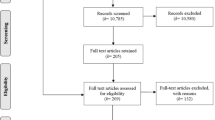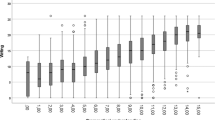Abstract
The role of grammar instruction in the teaching of writing is contested in most Anglophone countries, with several robust meta-analyses finding no evidence of any beneficial effect. However, existing research is limited in that it only considers isolated grammar instruction and offers no theorisation of an instructional relationship between grammar and writing. This study, drawing on a theorised understanding of grammar as a meaning-making resource for writing development, set out to investigate the impact of contextualised grammar instruction on students’ writing performance. The study adopted a mixed-methods approach, with a randomised controlled trial and a complementary qualitative study. The statistical analyses indicate a positive effect on writing performance for the intervention group (e = 0.21; p < 0.001); but the study also indicates that the intervention impact differentially on different sub-groups, benefiting able writers more than weaker writers. The study is significant in being the first to supply rigorous, theorised evidence for the potential benefits of teaching grammar to support development in writing.
Similar content being viewed by others
References
Andrews, R., Torgerson, C., Beverton, S., Freeman, A., Locke, T., et al. (2006). The effect of grammar teaching on writing development. British Educational Research Journal, 32(1), 39–55.
Bateman, D. R., & Zidonis, F. J. (1966). The effect of a study of transformational grammar on the writing of ninth and tenth graders. Champagne, IL: National Council of Teachers of English.
Biesta, G. J. J. (2007). Why ‘what works’ won’t work. Evidence-based practice and the democratic deficit of educational research. Educational Theory, 57(1), 1–22.
Black, P., & Wiliam, D. (2003). ‘In praise of educational research’: Formative assessment. British Educational Research Journal, 29(5), 623–637.
Braddock, R., Lloyd-Jones, R., & Schoer, L. (1963). Research in written composition. Urbana: National Council of Teachers of English.
British Educational Research Association (BERA). (2004). Revised ethical guidelines for educational research: 2004. Nottingham, UK: BERA.
Burgess, T., Turvey, A., & Quarshie, R. (2000). Teaching grammar: Working with student teachers. Changing English, 7(1), 7–21.
Cajkler, W., & Hislam, J. (2002). Trainee teachers’ grammatical knowledge: The tension between public expectations and individual competence. Language Awareness, 11(3), 161–177.
Cajkler, W., & Hislam, J. (2004). Teaching and understanding grammar: How trainee teachers make sense of a new curriculum? In N. Bartels (Ed.), Applied linguistics in language teacher education (pp. 295–312). Dordrecht: Kluwer.
Cameron, D. (1997). Sparing the rod: What teachers need to know about grammar? Changing English, 4(2), 229–239.
Carter, R. (Ed.). (1990). Knowledge about language. London: Hodder and Stoughton.
Cohen, J. (1969). Statistical power analysis for the behavioral sciences. New York: Academic Press.
Cook, R., & Wei, W. (2002). Selection effects in randomized trials with count data. Statistics in Medicine, 21(4), 515–531.
Denham, K., & Lobeck, A. (2005). Language in the schools: Integrating linguistics into K12 teaching. Hillsdale, NJ: Lawrence Erlbaum Associates.
Denham, K., & Lobeck, A. (Eds.). (2010). Linguistics at school: Language awareness in primary and secondary education. Cambridge: Cambridge University Press.
Department for Children, Schools, and Families (DCSF). (2007). English in the national curriculum. http://curriculum.qcda.gov.uk/key-stages-3-and-4/subjects/key-stage-4/english/index.aspx. Accessed February 10, 2010.
Department for Education (DfE). (2011). Interim results for key stage 2 and 3 national curriculum assessments in England, 2010/2011. London: DfE. http://www.education.gov.uk/researchandstatistics/statistics/allstatistics/a00196847/interimresults. Accessed August 20, 2012.
Department for Education and Skills (DfES). (2001). Framework for teaching English: Years 7, 8 and 9. London: DfES.
Dixon, J. (1975). Growth through English. Sheffield: NATE.
Elley, W. B., Barham, I. H., Lamb, H., & Wylie, M. (1975). The role of grammar in a secondary school curriculum. New Zealand Council for Educational Studies, 10, 26–41.
Elley, W. B., Barham, I. H., Lamb, H., & Wylie, M. (1979). The role of grammar in a secondary school curriculum: Educational research series no. 60. Wellington: New Zealand Council for Educational Research.
EPPI Review Group for English. (2004). The effect of grammar teaching (syntax) in English on 5 to 16 year olds’ accuracy and quality in written composition. London: EPPI-Centre.
Fearn, L., & Farnan, N. (2007). When is a verb using functional grammar to teach writing? Journal of Basic Writing, 26(1), 1–26.
Fogel, H., & Ehri, L. C. (2000). Teaching elementary students who speak Black English vernacular to write in standard English: Effects of dialect transformation practice. Contemporary Educational Psychology, 25, 212–235.
Gordon, E. (2005). Grammar in New Zealand schools: Two case studies. English Teaching: Practice and Critique, 4(3), 48–68.
Graham, S., & Perin, D. (2007). Writing next: Effective strategies to improve writing of adolescents in middle and high schools—A report to Carnegie Corporation of New York. Washington, DC: Alliance for Excellent Education.
Hancock, C. (2009). How linguistics can inform the teaching of writing? In R. Beard, D. Myhill, J. Riley, & M. Nystrand (Eds.), The sage handbook of writing development (pp. 194–208). London: Sage.
Hillocks, G. (1986). Research on written composition. Urbana, IL: ERIC Clearing House on Reading and Communication Skills.
Hillocks, G., & Smith, M. (1991). Grammar and usage. In J. Flood, J. M. Jensen, D. Lapp, & J. R. Squire (Eds.), Handbook of research on teaching the English language arts (pp. 591–603). New York: MacMillan.
Hudson, R. (2001). Grammar teaching and writing skills: The research evidence. Syntax in the Schools, 17, 1–6.
Hudson, R. (2004). Why education needs linguistics? Journal of Linguistics, 40(1), 105–130.
Kolln, M. (2002). Rhetorical grammar: Grammatical choices, rhetorical effects. New York: Longman.
Laurinen, I. (1955). The development of sentence sense in the light of the results attained in the teaching of writing in Finnish primary schools. Unpublished PhD thesis.
Locke, T. (2005). Writing positions and rhetorical spaces. In B. Doecke & G. Parr (Eds.), Writing = learning (pp. 75–95). South Australia: AATE, Wakefield Press.
Locke, T. (2009). Grammar and writing—The international debate. In R. Beard, D. Myhill, J. Riley, & M. Nystrand (Eds.), The sage handbook of writing development (pp. 182–193). London: Sage.
Micciche, L. (2004). Making a case for rhetorical grammar. College Composition and Communication, 55(4), 716–737.
Moore, L., Graham, A., & Diamond, I. (2003). On the feasibility of conducting randomized comparison trials in education. British Education Research Journal, 29(5), 673–689.
Morrison, K. (2001). Randomised controlled trials for evidence-based education: Some problems in judging ‘what works’. Evaluation and Research in Education, 15(2), 69–83.
Mulder, J. (2010). Envisioning linguistics in secondary education: An Australian exemplar. In A. Denham & K. Lobeck (Eds.), Linguistics at school: Language awareness in primary and secondary education. Cambridge: Cambridge University Press.
Myhill, D. A. (2000). Misconceptions and difficulties in the acquisition of meta-linguistic knowledge. Language and Education, 14(3), 151–163.
Myhill, D. A. (2003). Principled understanding? Teaching the active and passive voice. Language and Education, 17(5), 355–370.
Myhill, D. A. (2010a). Ways of knowing: grammar as a tool for developing writing. In T. Locke (Ed.), Beyond the grammar wars: A resource for teachers and students on developing language knowledge in the English/literacy classroom (pp. 129–148). London: Routledge.
Myhill, D. A. (2010b). Harnessing grammar: weaving words and shaping texts. Better: Evidence-Based Education, Winter 2010, pp. 12–13.
Myhill, D. A. (2011). Living language, live debates: Grammar and standard English. In J. Davison, C. Daly, & J. Moss (Eds.), Debates in English Teaching (pp. 63–77). London: Routledge.
Myhill, D. A., & Jones, S. M. (2011). Policing grammar: The place of grammar in literacy policy. In A. Goodwyn, & C. Fuller (Eds.), The Literacy Game (pp. 45–62). London: Routledge.
Myhill, D. A., Lines, H. E., & Watson, A. (2011). Making meaning with grammar: A repertoire of possibilities. mETAphor, 2, 1–10.
Myhill, D. A., Jones, S. M., Lines, H. E., & Watson, A. (2012). Re-Thinking grammar: The impact of embedded grammar teaching on students’ writing and students’ metalinguistic understanding. Research Papers in Education, 27(2), 139–166.
National Commission on Writing in America’s Schools and Colleges (NCW). (2003). The neglected ‘R’: The need for a writing revolution. New York: College Board.
OFSTED. (2009). English at the crossroads. London: OFSTED.
Paraskevas, C. (2006). Grammar apprenticeship. English Journal, 95(5), 65–69.
Qualifications and Curriculum Authority (QCA). (1998). The grammar papers. London: QCA.
Queen’s English Society (QES). (2011). www.queens-english-society.com/about.aspx. Accessed January 20, 2011.
Robinson, N. (1959). The relation between knowledge of English grammar and ability in English compositions. Unpublished MEd thesis, University of Manchester.
Salahu-Din, D., Persky, H., & Miller, J. (2008). The nation’s report card: Writing 2007. Washington, DC: Institute of Education Sciences, US Department of Education.
Shadish, W. R., Cook, T., & Campbell, D. (2002). Experimental and quasi-experimental designs for generalized causal inference. Boston: Houghton Mifflin.
Slavin, R. E. (2002). Evidence-based education policies: Transforming educational practice and research. Educational Researcher, 31(7), 15–21.
Stark, R., Kopp, V., & Fischer, M. R. (2011). Case-based learning with worked examples in complex domains: Two experimental studies in undergraduate medical education. Learning and Instruction, 21(1), 22–33.
Sweller, J. (1988). Cognitive load during problem solving: Effects on learning. Cognitive Science, 12, 257–285.
Torgerson, C., Brooks, G., Porthouse, J., Burton, M., Robinson, A., Wright, K., et al. (2004). Adult literacy and numeracy interventions and outcomes: A review of controlled trials. London: National Research and Development Centre for Adult Literacy and Numeracy.
Van Gelderen, A. (2006). What we know without knowing it: Sense and nonsense in respect of linguistic reflection for students in elementary and secondary education. English Teaching: Practice and Critique, 5(1), 44–54.
Van Gelderen, A., & Oostdam, R. (2005). Effects of fluency training on the application of linguistic operations in writing. L1 Studies in Language and Literature, 5(2), 215–240.
Vavra, E. (1996). On not teaching grammar. English Journal, 85(7), 32–37.
Weaver, C. (1996). Teaching grammar in the context of writing. English Journal, 85(7), 15–24.
Wyse, D. (2004). Grammar for writing? A critical review of empirical evidence. British Journal of Educational Studies, 49(4), 411–427.
Acknowledgments
We are grateful to the Economic and Social Research Council (UK) for the funding which enabled this research to be undertaken.
Author information
Authors and Affiliations
Corresponding author
Appendices
Appendix 1
Writing task 1: challenges
Challenges come in many shapes and sizes, from adrenaline-pumping adventures like rock climbing or bungee jumping to more everyday events like starting a new school, overcoming a fear, getting into a team or learning a new skill. Often a challenge is small to someone else but very big to you—for example, having to say sorry for something you have done or meeting someone you don’t know for the first time.
Write an account of a challenge you have faced in your life so far for a school magazine feature on ‘challenging situations’
You could:
-
Describe the challenge.
-
Tell the story of how you tackled it and what happened in the end.
-
Reflect on how you feel about this now.
-
Choose language that will make your account vivid and interesting for someone else to read.
You might want to start like this:
At the time, it seemed like the biggest challenge of my life …
Writing task 2: childhood fears
All of us get frightened about things from time to time—especially when we are young children. Our fears may be based on something real that has happened or something we only imagine will happen. For example, it could have been a fear of something imaginary, such as serpents under the bed, or a very real fear, such as a fear of flies.
Write about your childhood fears, real or imagined, for a school magazine feature on ‘things that frighten us when we are small’
You could:
-
Choose a time when you were frightened or nervous about something.
-
Describe it in detail.
-
Explain why you were afraid and what happened in the end.
-
Reflect on how you feel about this now.
-
Choose language that will make your account vivid and interesting for someone else to read.
You might want to start like this:
I don’t think I have ever been as scared as when …
Appendix 2
See Table 6.
Rights and permissions
About this article
Cite this article
Jones, S., Myhill, D. & Bailey, T. Grammar for writing? An investigation of the effects of contextualised grammar teaching on students’ writing. Read Writ 26, 1241–1263 (2013). https://doi.org/10.1007/s11145-012-9416-1
Published:
Issue Date:
DOI: https://doi.org/10.1007/s11145-012-9416-1




